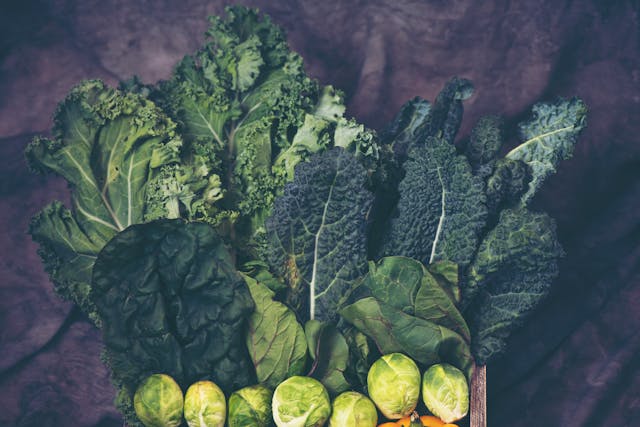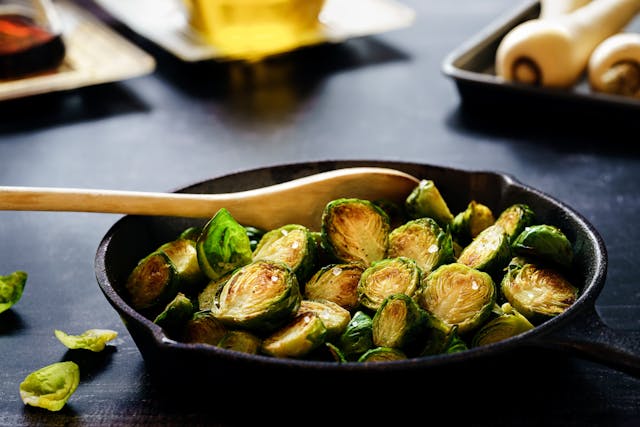Wondering, are brussels sprouts healthy? Find out through our guide of the health benefits, nutrition, and different ways to cook brussels sprouts.
Table of Content:
Brussels Sprouts
Brussels sprouts, often unfairly relegated to the “vegetables people love to hate,” have been enjoying a resurgence in recent years as people discover just how delicious and nutritious these little green gems can be. Resembling miniature cabbages, Brussels sprouts are part of the cruciferous vegetable family, alongside broccoli, kale, and cauliflower. They are packed with vitamins, minerals, and antioxidants that provide a wide range of health benefits, from boosting immunity to supporting heart health. In this article, we’ll explore the nutritional content, health benefits, and a variety of creative ways to enjoy Brussels sprouts in your diet.
Nutritional Profile of Brussels Sprouts
Brussels sprouts are low in calories but high in valuable nutrients. These tiny vegetables are particularly rich in fiber, vitamins C and K, and powerful antioxidants. Here’s a look at their nutritional profile per 100 grams of cooked Brussels sprouts:
- Calories: ~43 kcal
- Carbohydrates: 9 g
- Fiber: 3.8 g
- Protein: 3.4 g
- Fat: 0.3 g
- Key Vitamins and Minerals:
- Vitamin K: 177 mcg (more than 150% of the daily recommended intake)
- Vitamin C: 85 mg (over 100% of the daily recommended intake)
- Folate: 61 mcg (15% of the daily recommended intake)
- Vitamin A: 38 mcg
- Potassium: 389 mg
- Manganese: 0.3 mg
- Iron: 1.2 mg
- Calcium: 36 mg
- Antioxidants: High levels of glucosinolates, sulfur-containing compounds with anticancer properties
This dense concentration of nutrients makes Brussels sprouts a potent addition to any diet, contributing to both general health and the prevention of chronic diseases.

Health Benefits of Brussels Sprouts
1. Packed with Antioxidants
Brussels sprouts are rich in antioxidants, which play a vital role in protecting the body from oxidative stress caused by free radicals. One of the most notable antioxidants in Brussels sprouts is kaempferol, a compound known for its anti-inflammatory and cancer-fighting properties.
Additionally, Brussels sprouts are part of the cruciferous vegetable family, which contains glucosinolates. When these compounds are broken down, they produce sulforaphane, a potent antioxidant linked to cancer prevention. Research suggests that sulforaphane helps protect cells from DNA damage and inhibits the growth of cancerous cells, particularly in cancers of the colon, lungs, and prostate.
2. Immune System Booster
Brussels sprouts are an excellent source of vitamin C, which is well-known for its role in supporting immune function. One serving of Brussels sprouts contains more than 100% of the daily recommended intake of vitamin C, helping to stimulate the production of white blood cells and enhance the body’s ability to fight infections. Vitamin C is also essential for tissue repair and skin health, as it plays a key role in collagen production.
3. Bone Health Support
One of the standout nutrients in Brussels sprouts is vitamin K, which is critical for maintaining strong bones. Vitamin K helps regulate calcium in the body and improves bone density, reducing the risk of fractures and osteoporosis. It also works alongside vitamin D to enhance calcium metabolism, further contributing to skeletal health. With over 150% of the daily recommended intake of vitamin K in just 100 grams of Brussels sprouts, these vegetables are a fantastic way to keep your bones healthy and strong.
4. Improves Digestive Health
Dietary fiber is essential for a healthy digestive system, and Brussels sprouts are an excellent source of it. The fiber in Brussels sprouts helps promote regular bowel movements, prevent constipation, and support gut health by feeding beneficial bacteria in the digestive tract. A high-fiber diet is also linked to a lower risk of developing conditions like irritable bowel syndrome (IBS) and diverticulitis.
Additionally, Brussels sprouts’ high water content further supports digestion, helping to soften stool and ease its passage through the digestive tract.
5. Promotes Heart Health
Brussels sprouts are beneficial for heart health in several ways. Their high fiber content helps lower LDL (bad) cholesterol levels by binding to cholesterol in the digestive system and facilitating its removal from the body. Lower cholesterol levels can significantly reduce the risk of developing heart disease.
Moreover, Brussels sprouts are rich in potassium, a mineral that helps regulate blood pressure by counterbalancing the effects of sodium. Potassium is vital for maintaining healthy blood vessels and promoting proper heart function. The anti-inflammatory and antioxidant properties of Brussels sprouts further protect against damage to blood vessels, reducing the risk of atherosclerosis, a condition in which plaque builds up in the arteries and restricts blood flow.
6. Helps Regulate Blood Sugar
Brussels sprouts can help regulate blood sugar levels, making them a good option for people with or at risk of developing type 2 diabetes. The high fiber content slows the absorption of sugars into the bloodstream, preventing spikes in blood glucose. Additionally, Brussels sprouts contain an antioxidant called alpha-lipoic acid, which has been studied for its potential to increase insulin sensitivity and lower blood sugar levels.
7. Potential Cancer-Fighting Properties
The compounds found in Brussels sprouts, particularly sulforaphane and indole-3-carbinol, have been linked to cancer prevention. Sulforaphane has been studied extensively for its ability to neutralize carcinogens, inhibit cancer cell growth, and induce the death of damaged cells. Including Brussels sprouts and other cruciferous vegetables in your diet may help lower your risk of several types of cancer, including colorectal, breast, lung, and prostate cancers.
How to Enjoy Brussels Sprouts
Brussels sprouts are incredibly versatile and can be cooked in many different ways, allowing you to enjoy their unique flavor in various dishes. The following are some popular and delicious methods for preparing Brussels sprouts.

1. Roasted Brussels Sprouts
Roasting Brussels sprouts is one of the most popular ways to prepare them because it brings out their natural sweetness and gives them a crispy, caramelized texture.
Instructions: Preheat your oven to 400°F (200°C). Trim and halve the Brussels sprouts, then toss them with olive oil, salt, and pepper. Spread them out on a baking sheet and roast for 25-30 minutes, turning halfway through until they are golden brown and crispy. You can add flavor with garlic, balsamic vinegar, or a sprinkle of Parmesan cheese.
2. Sautéed Brussels Sprouts with Garlic
For a quick and flavorful side dish, try sautéing Brussels sprouts with garlic.
Instructions: Heat olive oil in a pan, add minced garlic, and sauté for about a minute. Add halved Brussels sprouts and cook for 8-10 minutes, stirring occasionally, until they are tender and slightly browned. Finish with a squeeze of lemon juice for brightness and a sprinkle of salt.
3. Shaved Brussels Sprouts Salad
Raw Brussels sprouts can be shaved thin and used as a base for a fresh and crunchy salad.
Instructions: Use a mandoline or a sharp knife to thinly slice the Brussels sprouts. Toss them with dried cranberries, toasted almonds, and a simple lemon vinaigrette. Top with shaved Parmesan cheese for an extra layer of flavor.
4. Brussels Sprouts Gratin
This creamy, cheesy dish is perfect for special occasions or when you want to indulge a little.
Instructions: Blanch Brussels sprouts in boiling water for a few minutes, then transfer them to an oven-safe dish. Pour a mixture of heavy cream and garlic over the sprouts, top with shredded Gruyère or Parmesan cheese, and bake at 375°F (190°C) for 20-25 minutes until golden and bubbly.
5. Brussels Sprouts with Bacon
One of the most popular combinations, Brussels sprouts with bacon, creates a delicious balance between the earthy flavor of the sprouts and the salty richness of the bacon.
Instructions: Cook chopped bacon in a pan until crispy, then remove the bacon and set it aside. In the same pan, sauté halved Brussels sprouts in the bacon fat until golden and tender. Toss the sprouts with the crispy bacon and finish with a splash of balsamic vinegar.


